

Ancient Greece - Gods and Goddesses - The British Museum. Family tree of the Greek gods. Key: The essential Olympians' names are given in bold font.
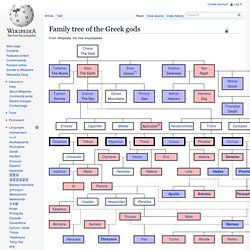
See also List of Greek mythological figures Notes External links Media related to Family trees of Greek mythology at Wikimedia Commons. Pantheon. Mythology: Greek, Roman, Norse, Egyptian, American Indian. Interactive Greek Gods Family Tree. THEOI GREEK MYTHOLOGY, Exploring Mythology & the Greek Gods in Classical Literature & Art. Greek Mythology. Mythical Chronology of Greece. This Mythical Chronology of Greece depicts the traditional chronology established for the events of ancient Greek mythology by ancient chronographers and mythographers.
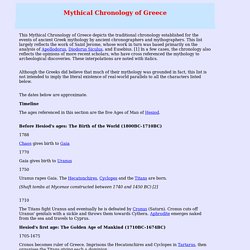
Greek Gods Family Tree / Genealogy. Ludios.org.
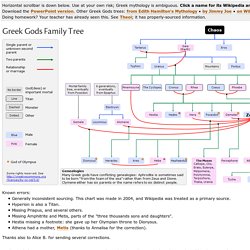
Mythology Guide - A dictionary of Greek and Roman Myths. Greek mythology, The 12 Gods of Olympus. THEOI GREEK MYTHOLOGY, Exploring Mythology & the Greek Gods in Classical Literature & Art. The Battle with the Titans - Classical Mythology. With his rescued siblings, Zeus had the beginnings of an army with which to challenge Cronus.

However, Cronus had some difficulty in assembling his own forces. Some of the Titans refused to help him in the struggle. None of the Titanesses participated, and Oceanus, Cronus's brother, also refused to fight. Chaos (cosmogony) Mahabharatha and Trojan war - Greek influence on India. Pandavas were sent to forest for 14 years, similarly the Greek-Trojan conflict went on for nearly 14 years.
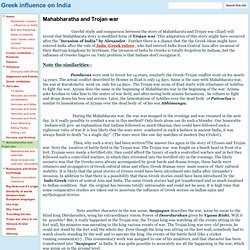
The actual conflict described by Homer in Iliad is only 14 days. Same is the case with Mahabharata war, the war at Kurukshetra went on only for 14 days. The Trojan war scene of Iliad starts with reluctance of Achilles to fight the war. Greco-Roman mysteries. See Western esotericism for modern "mystery religions" in the Western cultural sphere.
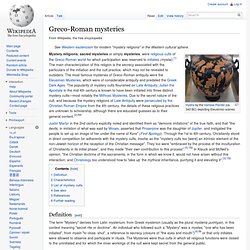
Definition[edit] The term "Mystery" derives from Latin mysterium, from Greek mysterion (usually as the plural mysteria μυστήρια), in this context meaning "secret rite or doctrine". An individual who followed such a "Mystery" was a mystes, "one who has been initiated", from myein "to close, shut", a reference to secrecy (closure of "the eyes and mouth")[4]:56 or that only initiates were allowed to observe and participate in rituals. The Mysteries were thus cults in which all religious functions were closed to the uninitiated and for which the inner workings of the cult were kept secret from the general public. Characteristics[edit] Mystery religions form one of three types of Hellenistic religion, the others being the imperial cult or ethnic religion particular to a nation or state, and the philosophic religions such as Neoplatonism.
Mysteries thus supplement rather than compete with civil religion. Greek Stories about Zeus-The Birth of Zeus, the King of the Gods. Zeus was born by the Titans Cronus and Rhea.
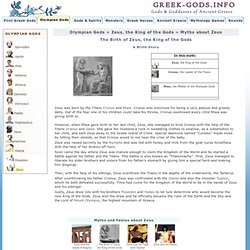
Cronus was notorious for being a very jealous and greedy deity. Out of the fear one of his children could take his throne, Cronus swallowed every child Rhea was giving birth to. Greek Creation Story, Cronus and Rhea and Birth of Zeus. According to Greek mythology, in the beginning there was nothing.
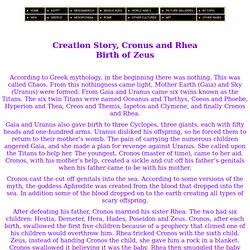
This was called Chaos. From this nothingness came light, Mother Earth (Gaia) and Sky (Uranus) were formed. From Gaia and Uranus came six twins known as the Titans. The six twin Titans were named Oceanus and Thethys, Coeos and Phoebe, Hyperion and Thea, Creos and Themis, Iapetos and Clymene, and finally Cronos and Rhea. Gaia and Uranus also gave birth to three Cyclopes, three giants, each with fifty heads and one-hundred arms. Cronos cast the cut off genitals into the sea. After defeating his father, Cronos married his sister Rhea. Major Gods and Goddesses Aphrodite | Apollo | Ares | Artemis | Athena | Demeter | Dionysus Hades | Hephaestus | Hera | Hermes | Hestia | Poseidon | Zeus Heroes. Homère. Iliade. Odyssée. Homère. Ancient Greece - history, mythology, art, culture and architectu.
Ancient Greece - history, mythology, art, culture and architectu. Gaia (Greek Mythology) The Greek word γαῖα (transliterated as gaia) is a collateral form of γῆ[4] (gē, Doric γᾶ ga and probably δᾶ da)[5] meaning Earth,[6] a word of uncertain origin.[7] R.
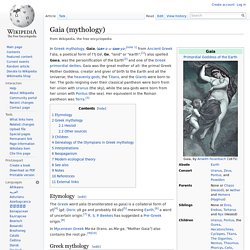
S. P. Beekes has suggested a Pre-Greek origin.[8] In Mycenean Greek Ma-ka (trans. as Ma-ga, "Mother Gaia") also contains the root ga-.[9][10] Apollo (Crown) Family tree of the Greek gods. Tendances spatio-temporelles de la qualité du sperme en France / Actualités / Actualités. La revue Reproduction vient de publier les résultats de l’étude menée par l’InVS sur les tendances spatio-temporelles de la qualité du sperme en France.

Ce travail s’inscrit dans la continuité de l’étude réalisée par l’Institut et publiée en décembre 2012 dans la revue Human Reproduction. Cette première étude concluait à un déclin de la qualité du sperme en France (concentration et morphologie des spermatozoïdes) dans un échantillon proche de la population générale entre 1989 et 2005. Cette étude était innovante par rapport aux éléments disponibles antérieurement à ce sujet en France, du fait notamment de l’échantillon étudié (26 609 hommes), couvrant la totalité du territoire métropolitain sur une période importante (17 ans). Les résultats montrent que la concentration et la qualité morphologique des spermatozoïdes a baissé dans la quasi-totalité des régions avec une diminution plus importante en Aquitaine et Midi-Pyrénées. Evolution de la concentration en spermatozoïdes de 1989 à 2005.
Pedro Olalla: ¿Por qué Grecia? Οι Ισπανοί διαφημίζουν καλύτερα την Ελλάδα από ότι εμείς οι ίδιοι [βίντεο]
Greek Anthology. The van Bosch and van Lennep version of The Greek Anthology (in five vols., begun by Bosch in 1795, finished and published by Lennep in 1822). Photographed at The British Museum, London. Contains the metrical Latin version of Grotius's Planuedean version of the Anthology. Heavily illustrated.